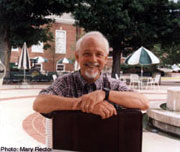Los Angeles Times Examination of "News as Entertainment" Includes Analysis from Prof. Robert Calvert
July 11, 2004
 July 11, 2004, Greencastle, Ind. - "The wealthier a society is, the more self-consciously individualistic it is and the less an individual feels obligated to consider things outside oneself and one's immediate interests," Robert Calvert, professor of political science, is quoted in today's Los Angeles Times. The column, by media critic David Shaw, examines how the public's expectations of news and information -- and even preparation for life -- have changed. "The last thing kids want out of a college education today is to learn how to be a better citizen. All they're concerned with is career preparation," Dr. Calvert adds.
July 11, 2004, Greencastle, Ind. - "The wealthier a society is, the more self-consciously individualistic it is and the less an individual feels obligated to consider things outside oneself and one's immediate interests," Robert Calvert, professor of political science, is quoted in today's Los Angeles Times. The column, by media critic David Shaw, examines how the public's expectations of news and information -- and even preparation for life -- have changed. "The last thing kids want out of a college education today is to learn how to be a better citizen. All they're concerned with is career preparation," Dr. Calvert adds.
Shaw writes, "Calvert thinks this mind-set leads to more —- worse —- than mere civic ignorance. 'You wind up with people working for, and maybe at the top of, major industries who have no interest in institutions or in our cultural and moral environment, and that's a real national problem,' he says. 'That's how you wind up with Enron.'"
The piece, which in titled "News as entertainment is sadly becoming the norm," begins, "'We report, you decide.' That's the slogan of FOX News. It's baloney, of course. FOX is probably the most biased of all mainstream news outlets. But FOX has been successful — at least in part, I'm convinced -- because more and more people want biased news, no matter how much they protest to the contrary. Actually, let me rephrase that slightly. I think a growing number of people -- still a minority, thank God, but a growing number nonetheless — don't really want unbiased, straightforward news reporting. When they complain about bias, what they're really complaining about, whether they're on the left or the right, is that the news isn't biased in favor of their side  of the argument. Too many people these days are intellectually lazy. They don't want to sort through conflicting reports, often presented in a relatively dry, factual fashion, to figure out what's important and who's right in any news-making scenario. They want pre-packaged news -- news presented in small, entertaining bites and delivered with edge, with attitude (which, for much of the day's news, means a particular viewpoint, a partisan or ideological bias)."
of the argument. Too many people these days are intellectually lazy. They don't want to sort through conflicting reports, often presented in a relatively dry, factual fashion, to figure out what's important and who's right in any news-making scenario. They want pre-packaged news -- news presented in small, entertaining bites and delivered with edge, with attitude (which, for much of the day's news, means a particular viewpoint, a partisan or ideological bias)."
Access the complete text (a paid subscription to the Times is required) by clicking here.
Source: Los Angeles Times
